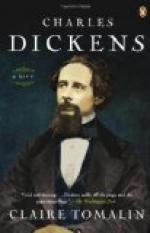So much the first readers of “Pickwick” might note as the book unfolded itself to them, part by part; and they might also note one or two things besides. They might note—they could scarcely fail to do so—that though there was a touch of caricature in nearly all the characters, yet those characters were, one and all, wonderfully real, and very much alive. It was no world of shadows to which the author introduced them. Mr. Pickwick had a very distinct existence, and so had his three friends, and Bob Sawyer, and Benjamin Allen, and Mr. Jingle, and Tony Weller, and all the swarm of minor characters. While as to Sam Weller, if it be really true that he averted impending ruin from the book, and turned defeat into victory, one can only say that it was like him. When did he ever “stint stroke” in “foughten field”? By what array of adverse circumstances was he ever taken at a disadvantage? To have created a character of this vitality, of this individual force, would be a feather in the cap of any novelist who ever lived. Something I think of Dickens’ own blood passed into this special progeniture of his. It has been irreverently said that Falstaff might represent Shakespeare in his cups, just as Hamlet might represent him in his more sober moments. So I have always had a kind of fancy that Sam Weller might be regarded as Dickens himself seen in a certain aspect—a sort of Dickens, shall I say?—in an humbler sphere of life, and who had never devoted himself to literature. There is in both the same




